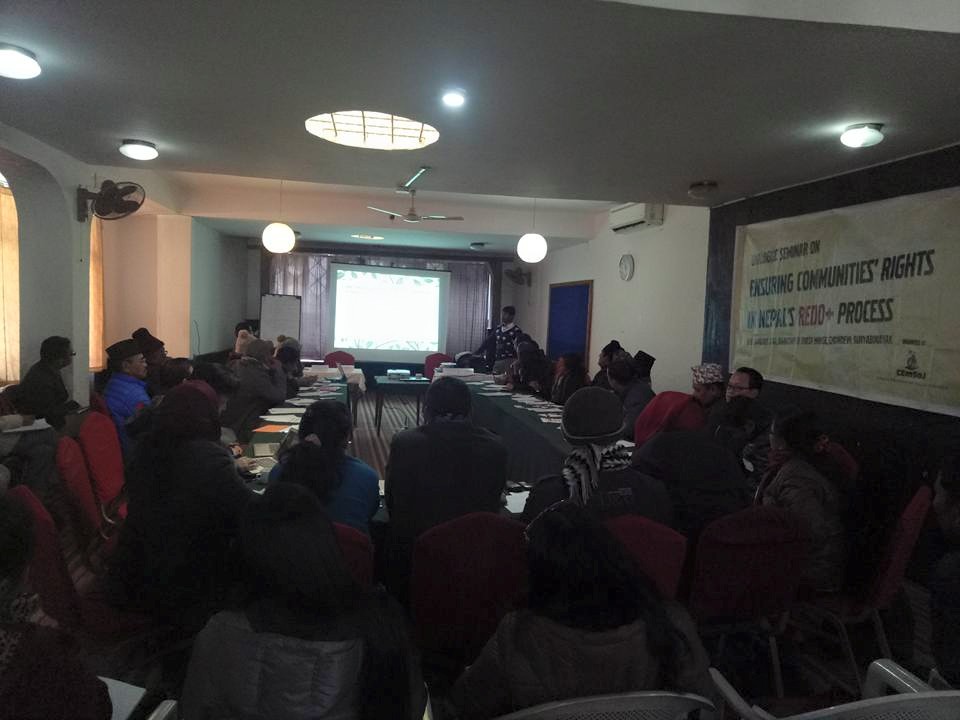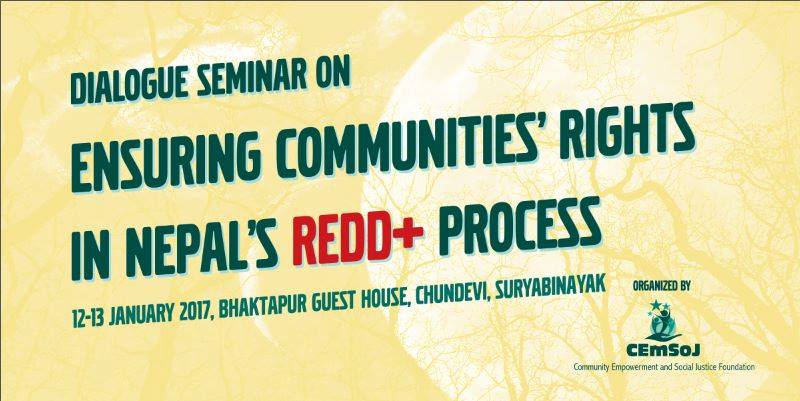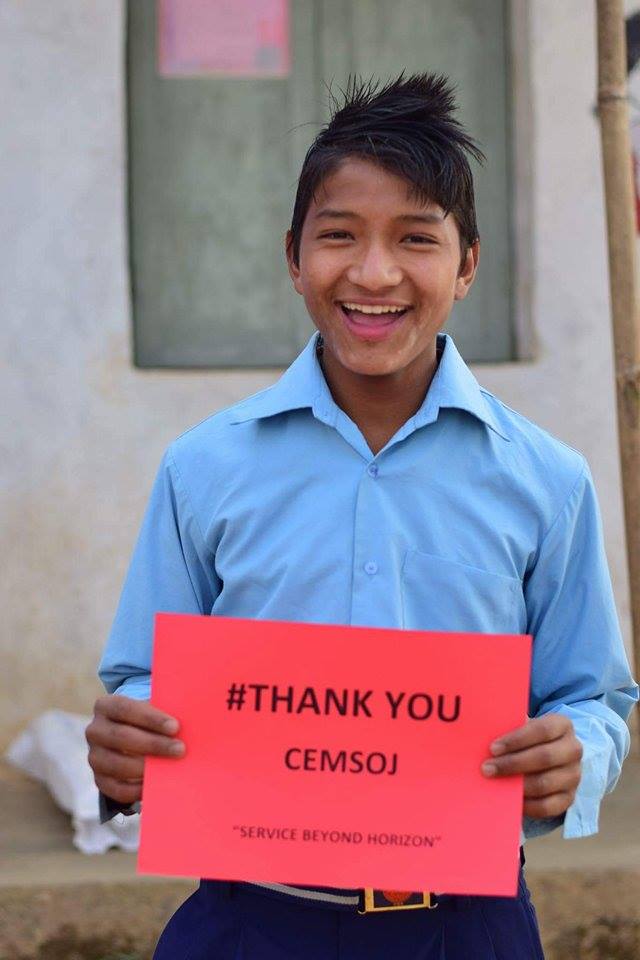Community Empowerment and Social Justice (CEmSoJ) Foundation
Public Statement
Tuesday, 22 September 2015
A writ petition has been filed at Supreme Court on Friday demanding annulment of REDD+ process being implemented in Nepal for mitigation of impacts of climate change. The petition claims that the process will negatively impact the national authority over forests and rights of indigenous and forest-dependent communities. First hearing of the petition is scheduled for today.
Community Empowerment and Social Justice (CEmSoJ) Foundation filed the writ petition with the Office of the Prime Minister and Council of Ministers, Ministry of Forests and Soil Conservation and the Departments under it, among other government agencies as defendants. The Foundation has demanded issuance of an interim order to halt implementation of REDD+ processes in Nepal until final decision is made on the case.
Population growth and uncontrolled industrialization have caused imbalance in the natural atmospheric and weather cycles, which is known as climate change. In recent years, excessive melting of snow in the mountains, bursting of glaciers, occurrence of floods and landslides due to heavy rainfall against regular weather cycles have been occurring as a result of climate change.
Increase in the amount of carbon dioxide, which is the major greenhouse gas, in the atmosphere that is resulting in global warming is the main cause of climate change. Use of fossil fuels (petroleum, gas and coal) for factories, means of transport and other works causes emission of carbon dioxide in a large quantity. However, instead of addressing the source of emissions by reducing extraction and consumption of fossil fuels and making factories environment-friendly, Reducing Emissions from Deforestation and Forest Degradation (REDD) in developing countries is currently being taken as a major measure of minimizing impacts of climate change. Lately, the REDD concept has been further refined and called REDD+ incorporating measures of effective conservation, sustainable management and public promotion of forests.
Under UN carbon offset schemes as per REDD+ concept, with involvement of World Bank, between 2000 and 2010, a total of 500 million acres of land in Asia, Africa, Latin America and the Caribbean was acquired or negotiated under deals brokered on behalf of foreign governments or transnational corporations. Many such deals are geared toward growing crops or biofuels for export to richer, developed countries – with the consequence that smallholder farmers are displaced from their land and lose their livelihood while local communities go hungry. The concentration of ownership of the world’s farmland in the hands of powerful investors and corporations is rapidly accelerating.
UN studies had projected risks of various human rights violations and destruction of biodiversity as a result of developing countries undertaking massive land concessions to multinational companies in order to attract foreign investments under REDD+ concept. Such impacts of REDD are now already occurring. Despite such impacts, developing countries, including Nepal, are rapidly embarking on policy formulation and implementation of REDD without any effort to effectively address those impacts.
Nepal is among those countries that are currently undergoing a REDD+ Readiness process with considerable amount of international support. Under its REDD+ Readiness Preparation Proposal, Nepal has formed a national REDD+ structure and undertaken monitoring, documentation and verification programs as well as studies and research along with capacity building trainings, regional conferences and interaction workshops. Following number of national, regional and local consultation workshops, Nepal’s Government has made public a National REDD Plus Strategy for Nepal and has been collecting suggestions on the strategy.
Nepal’s institutional REDD+ planning structure is highly dominated by techno-bureaucratic top-down practices representing government interests and international donors’ requirements. According to various reports, there has been little participation of community forest user groups’ representatives and negligible participation of indigenous peoples’ representatives. This is despite legal provisions in line with Free, Prior and Informed Consent requirements as prescribed by REDD+ decisions under the United Nation’s Framework Convention on Climate Change (UNFCCC).
There is strong likelihood that Nepal’s forests, lands and other resources, which are properties of the nation and people, will go under the control and authority of international institutions such as the World Bank and multinational and private companies when those resources are made available for international market based carbon trade under implementation of REDD concept. That can raise question on the sovereign powers and state authority inherent in the people of Nepal. Thus, the writ petition demands for annulling the entire REDD+ process through a certiorari mandamus.
However, if REDD+ process is to be carried on, the writ petition calls for issuance of necessary appropriate order or warrant to the defendants for ensuring meaningful participation of indigenous peoples, Dalits, women and other groups on the basis of principles of proportional inclusion in REDD+ related structures and for complying with ILO Convention 169, UN Declaration on the Rights of Indigenous Peoples, UNFCCC and other relevant instruments in course of formulating REDD+ related strategies and policies and the entire process.
Further, the writ petition demands issuance of appropriate mandamus to carry out necessary study to annul or revise Nepal’s Land Act, 1964 and Forest Act, 1993 that are the basis of Nepal’s REDD+ related process since those laws are not in line with international human rights standards of indigenous peoples.
For draft translation of the writ petition, click here.
For further inquiries, write to cemsoj@gmail.com
 The participants identified the need to undertake greater awareness raising on REDD+ particularly at the community levels, stronger advocacy and litigation for legal reforms to make Nepal’s relevant laws at par international human rights standards including the UN Declaration on the Rights of Indigenous Peoples and put greater attention to specific impacts on indigenous women due to climate change and proposed solutions therefor, among others at the conclusion of the seminar.
The participants identified the need to undertake greater awareness raising on REDD+ particularly at the community levels, stronger advocacy and litigation for legal reforms to make Nepal’s relevant laws at par international human rights standards including the UN Declaration on the Rights of Indigenous Peoples and put greater attention to specific impacts on indigenous women due to climate change and proposed solutions therefor, among others at the conclusion of the seminar.


 The government of Nepal must urgently address concerns about the new constitution, which fails to adequately protect the rights of minorities and indigenous peoples, or face a devastating humanitarian crisis as winter looms, Minority Rights Group International (MRG) said today.
The government of Nepal must urgently address concerns about the new constitution, which fails to adequately protect the rights of minorities and indigenous peoples, or face a devastating humanitarian crisis as winter looms, Minority Rights Group International (MRG) said today.